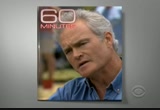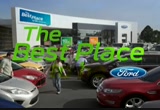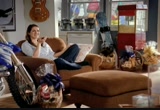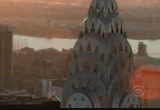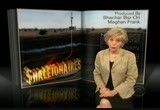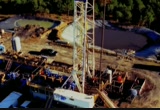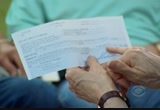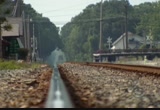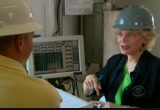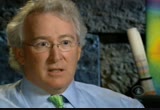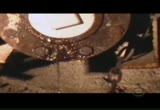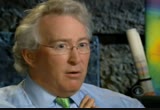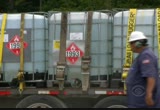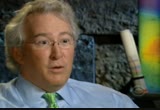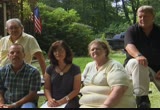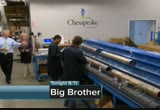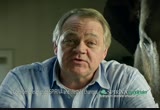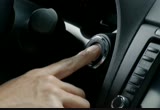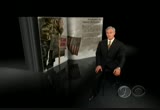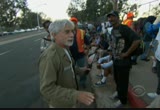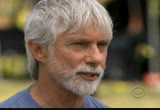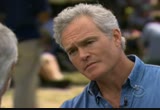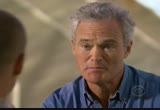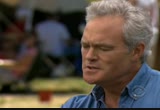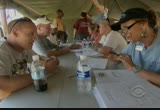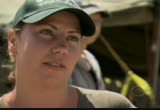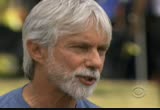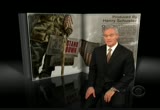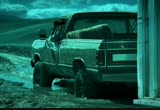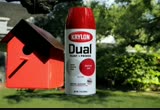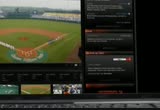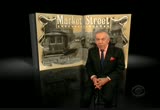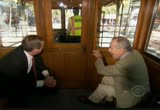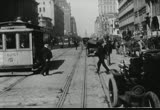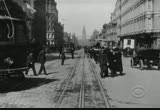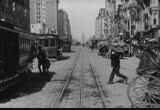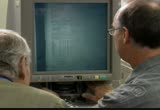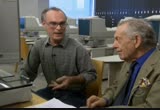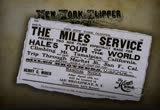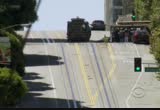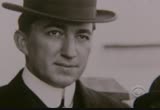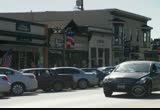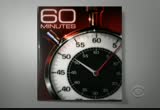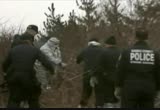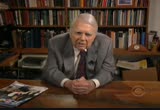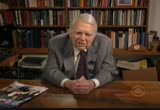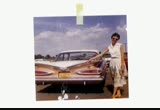tv 60 Minutes CBS July 10, 2011 7:00pm-8:00pm EDT
7:00 pm
captioning funded by cbs and ford-- built for the road ahead. >> in the last few years, we've discovered the equivalent of two saudi arabias of oil in the form of natural gas in the united states. not one, but two. >> stahl: he's talking about natural gas extracted from shale, the new hope for america's energy future with production or exploration in over 30 states, making overnight millionaires of the farmers who lease their land for drilling. so you gentlemen are living in a good, old-fashioned gold rush. >> it's a gift from the good lord. >> yee-haw!
7:01 pm
>> pelley: it's a convention of sorts, a three-day campout for military veterans-- veterans who are homeless. >> come on down! >> pelley: nearly 1,000 showed up, and among them, surprisingly, young vets, some just back from the war. how long you been homeless? >> a few months, about six. >> i don't want to waste my life anymore. i'm tired of it. >> pelley: for thousands, coming home can mean no place to go. >> the troops that are going to come back from afghanistan and from iraq, is this country prepared for that? >> i don't think so. >> safer: you are about to see a remarkable footnote to history, a film made more than 100 years ago on market street, san francisco's main thoroughfare. teddy roosevelt was president then. life expectancy was 47 years for men, 50 for women. san francisco closing in on its rendezvous with catastrophe.
7:02 pm
the odds are some of the people you see had just days to live. >> i'm steve kroft. >> i'm lesley stahl. >> i'm bob simon. >> i'm morley safer. >> i'm byron pitts. >> i'm scott pelley. those stories and andy rooney tonight on "60 minutes." so where's the best place to be this summer? i'm gonna say leading the way with ford... it's only the best-selling brand in america. when you're cruising around town in a ford fusion... you're cruising in style... and on the highway... you're getting 33 miles per gallon. plus, ford fusion was ranked the most dependable among midsize cars by j.d. power and associates. so, when's the best time to get a great deal? that'd be right now. now during the ford best place to be sales event, get a fusion with 0% apr financing for 60 months. the ford best place to be sales event. it's a great place to be.
7:03 pm
have you ever won anything before? no. [ radio dj ] alright, well here's your question. what is the deepest lake in the us? oh, boy, way to give me the hardest. geography was never my... crater lake. [ radio dj ] you have just won an oversized chess set! i have an oversized chess set. sorry. [ radio dj ] then how about an inflatable bouncy castle? bouncy castle. yeah, i have that too. [ radio dj ] i can give you an entire day with '70s rocker edgar winter!? you know what? just give me another bouncy castle. [ male announcer ] only at&t lets your iphone talk and surf at the same time. it's the network of possibilities. talk and surf at the same time. we went around the country asking women to speak frankly about something no one wants to talk about. it's time to get real about what happens in the bathroom. stop all the cutesy stuff. and start talking about what you really want from your toilet paper. it's time to talk about clean. feeling clean is so important. vo: quilted northern soft & strong is stronger than the leading rippled brand to help protect against breakthrough.
7:04 pm
for myself, for my family, it keeps us clean. i use quilted northern. quilted northern soft & strong. protection for a confident clean or your money back. a fiber that dissolves completely, is clearly different. benefiber. it's the easy way to get more fiber everyday. that's the beauty of benefiber. >> stahl: natural gas has been the ugly stepchild of our national energy debate, never enjoying the political muscle of oil and coal, and never
7:05 pm
capturing the imagination like solar panels and wind farms. and to top it all off, it was in short supply. but that's changing. and now, this stepchild is being touted as the hope of the future, the answer to our energy problems. what's brought about the change is there's a new, unconventional process for extracting natural gas from shale, a dense rock formation two miles underground. and if you're sitting on top of it, you may become a new american phenomenon, a "shale- ionaire." and yet, if the b.p. spill last summer taught us anything, it's that exploring for energy has safety risks. but as we first reported in november, that can get lost in all the excitement. what's increasingly evident is that shale gas is overwhelmingly abundant right here in the u.s.a. >> aubrey mcclendon: in the last few years, we've discovered the equivalent of two saudi arabias
7:06 pm
of oil in the form of natural gas in the united states. not one, but two. >> stahl: we have twice as much natural gas in this country-- is that what you're saying?-- than they have oil in saudi arabia? >> mcclendon: i'm trying to very clearly say exactly that. >> stahl: aubrey mcclendon is the c.e.o. of chesapeake energy, the largest independent gas producer in the country. he's on a mission to get us off foreign oil and dirty coal. gas has nearly half the carbon emissions of coal, and no mercury. but natural gas is still a fossil fuel. >> mcclendon: so is it perfect? no. the answer is, it's not perfect. but for the next 20 years, natural gas is probably our best bet. and the good news is, we've got it. and we've got as much of it as anybody else in the world. >> stahl: look at a map of shale formations across the country, and you'll see that there's production or exploration in over 30 states. it's an american energy renaissance. 10,000 wells will be drilled here in northwest louisiana in
7:07 pm
some of the poorest communities in the country, where impoverished farmers are becoming overnight millionaires, as they lease their land for drilling. >> c.b. leatherwood: i never dreamed of money like this. >> stahl: now you can do whatever you want? >> leatherwood: i can do what i want. >> stahl: c.b. leatherwood, a retired oil field worker, got a bundle to drill under his farm. >> leatherwood: i've got a copy of the check here. >> stahl: show me. oh, my, look at that. $434,000. >> leatherwood: right. >> stahl: just like that. >> leatherwood: it fell out of the sky. >> mike smith: boy, you done good, c.b. >> stahl: it fell out of the sky for c.b.'s cousin, mike smith, too. he was paid nearly $2 million. so what'd you do that day? >> smith: i sat back and thought about it for a... all day. and i said, "i'm a millionaire," and that didn't sound right, but... >> stahl: they actually call
7:08 pm
them "shale-ionaires," and they don't mind putting up with the noisy, smelly drilling when the wells are built because they get a cut of the profits, which could last for years and add up to millions more. so, you gentlemen are living in a good, old-fashioned gold rush. >> leatherwood: it's a gift from the good lord. >> stahl: within a year, shale drilling generated almost $6 billion here in new household earnings. as the rest of the nation plunged into a recession, this place added over 57,000 local jobs, and the cadillac dealership in town is hopping. this is your new car? oh. >> smith: yes. uh-huh. >> stahl: that is nice. >> smith: yes. >> stahl: you love it, don't you? >> smith: yeah, i love it. >> stahl: i like the color. it's champaign... >> smith: it's "gold mist." >> mcclendon: this is a million years worth of shale. >> stahl: people have known for a century that shale contained gas, but it was too difficult and pricy to extract. i can't believe there's anything in this rock. >> mcclendon: well, it doesn't
7:09 pm
look like it... >> stahl: it is so solid. i mean, it's really solid. but this is shale under a microscope. the dark spaces are where the gas is, and it's everywhere. >> mcclendon: oh, here's a great one. for example... >> stahl: that's what's going on in the middle of this thing? >> mcclendon: yes. >> stahl: the breakthrough in extraction happened when two existing technologies were combined. the first involved accessing the shale by drilling sideways underground. >> we're currently over two miles down. >> stahl: two miles down... >> two miles down. now, later today, we'll turn the bit from vertical to horizontal along this path, and then we'll drill in our target zone for a mile down to the south. >> stahl: the other technology is hydraulic fracturing, or "fracking," where millions of gallons of water, mixed with sand and chemicals, are pumped down the well at enormous pressure. >> we break the rock. we fracture the rock. and that stimulates the ability of the gas to flow into the well bore where we can flow it to the surface and sell it. >> stahl: in light of the b.p.
7:10 pm
oil spill in the gulf, i asked aubrey mcclendon about the safety of fracking. what would happen if you go down to dig for shale, and you have an explosion and you destroy a whole part of the country? >> mcclendon: it cannot happen, okay? >> stahl: it cannot happen. why do you say that? >> mcclendon: well, because we're not a mile underneath the surface of the ocean. and if something were to get away-- and there are incidents where wells have loss of control-- you can go... you can go fix it. >> stahl: an underground explosion is impossible because there's no oxygen or anything to ignite a blast. but as you can see from these pictures chesapeake took of their operations, drilling is now a fact of life near homes and farms. and the industry has racked up thousands of accidents and safety violations above ground. this really is your backyard on... oh, look at this. what happened in tim and christine ruggiero's backyard is happening more and more. they moved to this pastoral ten-
7:11 pm
acre ranch in decatur, texas, in 2004 to raise their horses and their daughter, reilly. but in 2009, a company called aruba petroleum came and drilled two wells outside their windows, leaving behind this permanent eyesore. >> tim ruggiero: you see over here on this tank? and you see where it's... where it's just been still leaking? >> stahl: oh, yeah. >> tim ruggiero: why is it doing that? >> stahl: that leaking is just the half of it-- they videotaped oozings and gushings. when the state environmental agency shot these hissing toxic air emissions with infrared cameras, the company was hit with a fine. i keep hearing that this process, the horizontal drilling and the fracking, is safe. >> tim ruggeiro: well, define "safe." safe for who? safe in the process, or safe for the people that are 200 feet away from it? >> christine ruggeiro: they put a concrete casing down into the ground in between your water table and the drilling fluid, but cement doesn't ever crack? you don't ever have well
7:12 pm
blowouts? >> stahl: in other words, taking shortcuts and human error are endemic to this drilling process. here, valves weren't tightened. a tank, left unattended, overflowed. fluids spilled from a frack container. aruba said they could not comment because the ruggieros are suing them. aubrey mcclendon's company, chesapeake, has a much better track record, but that doesn't mean they haven't had problems, too. >> mcclendon: if people are involved, accidents are going to happen. planes crash, trucks crash, cars crash. it happens. we will have an incident or two. >> stahl: has chesapeake ever had an accident? >> mcclendon: any kind of an accident? sure. probably the most publicized incident was in louisiana. >> stahl: it happened in 2009, when 17 cows grazing near a drilling site died a gruesome death after drinking fracking fluids that ran off into their pasture. industry-wide accidents keep happening, like this well explosion due to machine
7:13 pm
malfunctions or workers cutting corners. environmentalists like michael brune, executive director of the sierra club, say the industry is under-regulated. >> michael brune: i would say that they've been cavalier. i would say that they've been irresponsible. >> stahl: what should they have done? what should they do right now? >> brune: the first thing that the industry should do is disclose what chemicals are being used in fracking, and then limit the amount of toxic chemicals to a point of zero. >> stahl: the industry doesn't have to disclose what's in the tens of thousands of gallons of chemicals they use when they fracture the shale because of the so-called "halliburton loophole." halliburton is a leading fracking company, and the loophole was created in 2005 under vice-president dick cheney, who used to be halliburton's c.e.o. >> brune: the 2005 energy bill completely exempted the natural gas industry and fracking technology from any regulation under the safe drinking water act. it's an outrage. >> stahl: did the vice-president put that in there? >> brune: the vice-president
7:14 pm
advocated for it, and he pushed congress to insert it into the language. >> stahl: part of the fracturing process involves you pouring down some pretty nasty chemicals. what happens if they spill all over the place? >> mcclendon: okay, let's define "nasty chemicals." nasty chemicals are underneath your sink. the reality is, you don't drink drano for a reason, but you have drano in your house. if you want to define them as nasty, go ahead. >> stahl: there are nasty chemicals that affect your liver, that cause cancer, that shut down your system. >> mcclendon: yeah, you don't want to drink frack fluid. if you take away nothing from this interview... >> stahl: but isn't there a possibility that you go down, and something seeps and it gets into the water supply, gets into the aquifer? >> mcclendon: ah, that's the fear, isn't it? >> stahl: well, yes. of course, that's the fear. >> mcclendon: but freshwater aquifers are only from the surface to about 1,000 feet below the surface of the earth, okay? we are fracking wells at depths of 7,000, 8,000, 10,000, 12,000 feet, okay?
7:15 pm
so there is almost two miles of rock between where we are active and where freshwater is drawn from. >> stahl: last year, the environmental protection agency began studying the effects of fracking on drinking water. is the problem fracking, per se, or human error? consider what happened in this appalachian town in pennsylvania. in the shale gas gold rush, dimock is the ghost town. how many of you lost your water supply? and there are many more? >> yes. >> stahl: a company called cabot oil and gas paid many of the folks here $25 an acre, and they were happy until, one day, a water well exploded. >> bill ely: my boy had come over the night before and said... he just said, "dad, we got gas in the water over there. i can actually shake the jug up and light it." >> stahl: you put a match to your water and it went up in flames? >> ely: i can take my water, just put it in a gallon jug, shake it up, turn it up, and it'll explode, like.
7:16 pm
>> stahl: bill ely demonstrated it for us by hooking a hose from his well to a jug and lighting it. ( explosion ) >> ely: scary. >> stahl: state authorities have determined that gas leaked into the water because of a poor cement job. cabot now supplies bottled water to the residents but has admitted no guilt, so these folks are suing them. >> you know, this is a poor area. this is a perfect place to come in and drill. a lot of guys didn't have work. now, they're driving trucks. the bars are hopping, the rentals are full. so there is an economic boom here, but at what price? >> i can live without natural gas; i can't live without my water. >> brune: you have these landowners who will say that their water was clean. they could drink. they couldn't light it on fire. and then, the gas industry came in, and now taking a shower makes them sick. there are too many landowners who are describing the exact same scenario, and so it can't just... >> stahl: all over the country. >> brune: ...can't just be a coincidence.
7:17 pm
there's something wrong here. >> stahl: so here we have natural gas from shale touted as the solution to our energy problems by one group. another group says it's the biggest environmental nightmare. >> brune: ah, well, actually, they're both correct. so what we need to do is promote gas as a cleaner alternative to coal and oil, but hold the industry accountable for tighter standards. >> stahl: which aubrey mcclendon says he would go along with, because, he says, natural gas is such a huge game changer. >> mcclendon: if you use natural gas, america can establish independence from opec. it can put americans back to work. we can lower our carbon emissions, and we can begin to improve the economy, as well, by not exporting a billion dollars a day of american wealth. the greatest wealth transfer in human history takes place every day, and it doesn't have to. >> cbs money watch update sponsored by:
7:18 pm
>> mitchell: good evening. bank of america, citigroup and other major mortgage lenders must tell regulators this week how they'll reform their foreclosure practices. gas prices are rising again, up six cents last week to an average of $3.63 a gallon. and "transformers" wins again at the weekend box office. i'm russ mitchell, cbs news. ♪
7:20 pm
ten were named semi-finalists, ♪ five made it to times square, ♪ one rose above the rest. ♪ congratulations to courtney reid the winner of this year's folgers jingle contest. ♪ on a track that simulates the world's toughest roads. ♪ [ tires screeching ] ♪ if it can survive this drive... ♪ it can survive yours. the nissan altima. innovation that lasts. innovation for all. ♪ my 4-year-old son was diagnosed with autism. as a dad, you have all these goals
7:21 pm
and dreams and hopes for your son. and you're faced with the knowledge that he may be dependent on you for the rest of his life. i had to first realize that there's nothing wrong with him the way he is. it's the world who view him differently. i love him. my son is fine just the way he is. [ female announcer ] mutual of omaha. proud sponsor of life's aha moments. >> pelley: one weekend a year, nearly a thousand military veterans assemble in a camp in san diego. what brings them is what they have in common; they're all homeless. the vets gather for something called "stand down," started in 1988 by a solider-turned- psychologist named jon nachison. then, it was an emergency response to homelessness among vietnam vets. but all these years later, nachison is welcoming the generation from iraq and afghanistan. as we first reported last october, stand down is a three-
7:22 pm
day campout that's part jobs fair, part health clinic, part sobriety meeting. the name is a military term for the time when a solider can put down his weapon and stop fighting. the homeless go for a shot at redemption. we went to understand why so many people who've served their country find coming home so hard. >> hey, good morning, you guys. how you guys doing? we're going to have a great stand down this year. >> pelley: it's a friday morning in july. jon nachison is greeting his troops, homeless vets and their families who'd waited all night to get in. >> jon nachison: we're going to open the gates. let's do it. >> pelley: they were literally a battalion-- 947 men, women and children. >> good morning, sir. welcome to stand down. we'd like to give you a breakfast bag and something to drink. >> nachison: when people come in, they're instantly transported back to the military, a time when they wore the uniform, where they were
7:23 pm
proud, where they were walking tall. >> pelley: you want them to remember a time in life when they were proud of themselves. >> nachison: i want to evoke that person in them. >> pelley: nachison does that by putting them inside a military- style base on a san diego high school athletic field-- 30 tents erected by marines from nearby camp pendleton. here, there was hot chow, warm showers, clean clothes and fresh hope. so, who can you save? >> nachison: people can save their self; i... i can't save anybody. >> pelley: you don't expect a miracle to happen when they came here for three days. >> nachison: oh, i do. >> pelley: you do? >> nachison: i do. >> ready, sir? step forward. >> pelley: the chance at that miracle came with over 3,000 volunteers who helped the vets check into v.a. benefits and look into jobs. there was medical care, dental care... >> please remain seated and come to order. court is in session. >> pelley: ... and even a court where they could clear tickets for loitering or sleeping on the street.
7:24 pm
>> the matters that are currently pending are dismissed with people's motion. >> thank you, your honor. >> your welcome. >> pelley: why are these people on the street? >> nachison: there must be some gap that exists between military service and becoming a civilian. you're told what to wear, you know, you're given everything, and then suddenly, you've lost your entire family, you've lost your identity. >> pelley: you think some people fall through that gap between military life and civilian life? >> nachison: and for some people, it's a chasm. >> okay, mr. worley. >> pelley: it was a chasm for charles worley, who served with the marines in iraq. he's still in the reserves, subject to being recalled. we mistook him for a volunteer until we heard this. >> how long have you been homeless? >> charles worley: a few months, about six. >> have a good weekend. >> pelley: worley left the marines in 2008 and joined the great recession. like everyone at stand down, he had his service record verified
7:25 pm
by the v.a., then he was assigned to one of the tents that go by the names alpha, bravo, charlie, and so on. delta tent was worley's first home in a long time. where did you sleep the night before you came here? >> worley: in old town park down in san diego. >> pelley: he hadn't imagined that leaving a war could be risky. >> worley: i got used to the structure and was having a hard time adapting to civilian life, because if you change commands or you move from job to job in the marine corps, they give you a checklist. >> pelley: life gets pretty simple. >> worley: yeah, it's pretty simple. it's... you know, i turn... they say "turn right," you turn right as fast as you can without bumping into the guy next to you. you know, i didn't have a checklist when i got out. >> pelley: without a checklist, worley burned through the combat pay he'd saved before he looked for a job. turns out, unemployment among these young returning veterans is double the national rate, about 20%. the v.a. tells us that, already, there are more than 9,000 iraq and afghanistan vets living on the street. charles, what's it like out
7:26 pm
there living as a homeless man? >> worley: as sad as it is to say, i've gotten good at being homeless. when you have two pairs of jeans, a pair of shorts, and three shirts, and you don't have any money to wash them, after a while, the... you... you start to smell, and you know you smell. and so you try... i just try to what... try to avoid people. >> pelley: so you keep moving? >> worley: yes, sir. >> pelley: it's a familiar story for jon nachison, who, as a clinical psychologist, has been working with vets for almost 30 years. it's a new generation of homeless veterans. >> nachison: it is. this group is becoming homeless quicker than the vietnam veteran. vietnam vets came back, it took about eight to ten years before we started really seeing them on the street homeless. this group is coming back, and within a year, they're ending up on the street. and my best hunch is that, for many of them, it's these redeployments again and again. >> pelley: over the last ten years, almost 900,000 troops
7:27 pm
have been redeployed, sent back to combat at least once. getting redeployed two, three, four, even five times, why does that make a difference? >> nachison: when you go back and you are re-traumatized, it also brings up all the old stuff. go back again, and it layers over the top of that. and so now, we're getting to the point where it's going to be difficult for the person to function. >> pelley: more than two million troops have already served in iraq and afghanistan. the v.a. believes there could be thousands more homeless, in part because of the combat stress and brain injuries that roadside bombs inflict. already, more than 300,000 have asked for mental health treatment. the troops that are going to come back from afghanistan and from iraq, is this country prepared for that? >> nachison: i don't think so. >> pelley: saturday morning, we met marguerite somers and learned about something else that's new. there are more women among
7:28 pm
homeless vets, because women now make up 14% of our forces. somers is a former sailor who served until 1999, and she too had trouble making that transition from military to civilian life. shortly after getting out of the navy, she got divorced and began drinking. now, homeless three months, she is desperate for help with her alcoholism and meth abuse. >> marguerite somers: i have more potential than that, and i don't want to waste my life anymore. i'm tired of it. and this has given me new hope. >> pelley: you said that you'd lost everything and your family. >> somers: i lost my son a year ago because of my abuse issues. i owned a home. i lost that. i lost my family's support, i lost my job. wound up with a bunch of legal issues. you know, i was facing prison time. just nothing good came out of it. >> pelley: addiction is a big reason some vets remain on the street for years. >> my name is woody, and i'm an
7:29 pm
alcoholic and a combat veteran. >> my name's eddie... >> pelley: it's part of the deal at stand down that they come to the meetings that might be the first step to recovery. the best shot at rehab attracted marguerite somers to this tent. it was a chance to go to veterans village of san diego, which sponsors stand down. veterans village is an $8 million a year program, much of it funded by the v.a. it offers nearly a year of inpatient rehab. but it's overwhelmed. funding is limited, and they were taking applications to choose only 68 patients out of the 947 at stand down. >> do you want to get clean? >> yes, ma'am. >> pelley: they were looking for people who seemed motivated. somers wouldn't find out whether she made the cut until the next day, sunday. as we walked around the camp, we found some of the reasons that homelessness among vets is a chronic problem, with a quarter of a million on the streets last year.
7:30 pm
a lot of it is addiction and debilitating illness. bill yarling was more typical of those at stand down. older, an army medic in the 1980s, he'd been disabled by years of epileptic seizures. here, yarling knew what no one else could see-- that the solider inside hadn't surrendered. he washed off a year of homelessness and, if nothing else, enjoyed a cease fire from the struggle on the street. >> bill yarling: it's hard to explain. it really is. but it just makes you feel better about yourself. >> pelley: you get back in touch with... >> yarling: you get back in touch with reality. >> pelley: ...the person you were before you were homeless. >> yarling: exactly. and as you can tell, i did, you know? but... it's not easy living on the streets, okay? >> pelley: yarling came looking for housing, but he found what charles worley discovered.
7:31 pm
sometimes, the programs don't match the need. >> worley: no, i have a bed problem. i need somewhere to sleep, and if telling them i have an alcohol problem gets me a place to sleep, i will sit through the a.a. meetings and the classes so i can go to sleep at night and not have to worry about anything. >> pelley: worley and yarling couldn't get into available housing because they don't need rehab. there are other programs that provide housing for thousands of vets, but they cover about 20% of the homeless. >> worley: so, we've just wasted our time, haven't we? >> pelley: stand down can't track a thousand homeless vets, so there's really no way to know how many might have picked up a lead on a job or a home, or how many decided, finally, to stick to their recovery meetings. what we could count were those chosen to go into that veterans village inpatient rehab program. sunday morning, the vets came in one at a time, and most heard there was no room for them. >> marguerite.
7:32 pm
>> pelley: marguerite somers, who had no place to go, came in next. >> you followed through this weekend, and we think you'd be a great candidate. >> somers: yes. i made it. >> pelley: why do you think you can do it now? >> somers: i know i have that hope restored in me. and i have the resources. and i just know that's what i need to do now. and i want it for myself, you know. i... i'm done living like this. >> nachison: all right, we need everybody in this picture. come on, now, everybody in this picture. >> pelley: sunday afternoon... >> all right, ready? yee-haw. >> pelley: ...stand down ended with what they call graduation. >> come on down. left, right, kilo. >> pelley: they marched with military pride for one last shot of self-esteem. ( cheering ) bill yarling raised the flag for bravo tent; charles worley for delta.
7:33 pm
( applause ) >> so let's have everybody in the circle now. >> pelley: they joined hands in a closing prayer. ( cheers and applause ) >> pelley: then, it was time to leave. and when you see them leave, you think what? >> nachison: it's hard. it's like, you know, god speed, you know. and there's so much that people need to do to be able to... to reach that escape velocity from... from being homeless. i hope that they get it. i hope that they have it. >> pelley: recently, the v.a. set a goal of ending homelessness among vets in five years. and the government will spend a billion dollars this year on housing and rehab. but the 23rd annual stand down turned out to be the largest ever. >> this is just great. >> pelley: marguerite somers was
7:34 pm
among 68 who drove to rehab, while 879 others, including bill yarling and charles worley, picked up their burdens to rejoin their battles. fresh troops fell in with a column that spans generations. next weekend, veteran's village of san diego will hold its 24th stand down. charles worley plans to be there, this time as a volunteer. he's gotten back on his feet and is now in college. bill yarling will also be there, but again as a participant. he still hasn't found permanent housing. marguerite somers spent more than eight months in rehab and left clean and sober. >> welcome to the cbs sports update presented by viagra. i'm bill macatee. on the pga tour today, steve stricker won his third consecutive john deere classic at tpc deer run.
7:35 pm
stricker shot a final round 69. he finished at 22 under for the tournament. the win was stricker's second on the pga tour this year. and in the women's world cup quarterfinal, team u.s.a. defeated brazil in a penalty shoot-out. for more sports news and information, go to cbssports.com. ♪ [ male announcer ] you've reached the age where you don't back down from a challenge. this is the age of knowing how to make things happen. so, why would you let something like erectile dysfunction get in your way? isn't it time you talked to your doctor about viagra? 20 million men already have. with every age comes responsibility. ask your doctor if your heart is healthy enough for sex. do not take viagra if you take nitrates for chest pain, as it may cause an unsafe drop in blood pressure. side effects may include headache, flushing, upset stomach, and abnormal vision.
7:36 pm
to avoid long-term injury, seek immediate medical help for an erection lasting more than four hours. stop taking viagra and call your doctor right away if you experience a sudden decrease or loss in vision or hearing. this is the age of taking action. viagra. talk to your doctor. see if america's most prescribed ed treatment is right for you. ocean spray sparkling juice drinks in cranberry and pomegranate blueberry. they have bubbles and come in these really cool cans. it's real fruit juice, crisp, sparkling water, and no added sugar. comes in diet, too. it's refreshing, tasty -- the whole family will love it. you want one? i'll wait a bit. mm. refreshing. ocean spray sparkling juice drinks.
7:37 pm
find us on facebook. i was worried about 'em, you know? i mean for instance my mom went to bed tonight before making my dinner. which is fine, i mean i, i know how to make dinner. it just starts to make you wonder. is this what happens when you age? my friends used to say i was the lucky one. i had the fun parents. where's the fun now? night, guys. [ sighs ] ♪ [ male announcer ] toyota venza. keep on rolling. so we created stacked, stuffed and topped entrees, starting at $9.99. stacked, stuffed and topped! i like things smooshed. we'll work on that. [ male announcer ] only at applebee's. open 'til midnight or later.
7:39 pm
>> safer: we're about to take a short trip into the past, a remarkable glimpse of a footnote to history we first broadcast last april. it's a film made more than 100 years ago on market street, san francisco's main thoroughfare. in fascinating detail, it shows how people lived and dressed in what was then, as now, the golden city of the american west. the film is well known to historians. but who made it? and why? and most importantly, exactly when? for a century, time, like the fog that blankets san francisco, has shrouded the answers. but now we know. the film is a time traveler's glimpse of a joyous city on the brink of disaster.
7:40 pm
( bell rings ) our trip into the past begins on a san francisco streetcar built in 1895. >> rick laubscher: it still comes out once in awhile and carries passengers down the main street. it looks just like a cable car because it was built by the people who built the cable cars. >> safer: our tour guide is rick laubscher of the market street railway, a non-profit group that keeps the city's vintage trolleys rolling. >> laubscher: this is the main artery of san francisco and always has been. >> safer: market street is three miles long, 120 feet wide-- the beating heart of the city since the days of the gold rush. >> laubscher: this is where the original film started, right here, about 8th street. >> safer: right here is where the past comes alive, thanks to a camera mounted on the front of
7:41 pm
a cable car a century ago, catching glimpses of fashion, faces, and the helter-skelter of city traffic-- horses, trolley cars, and that new devil's own invention, the motor car. >> laubscher: you can see when people turn to look at the camera, it was really the shock of the new. can you imagine? here comes this contraption down the street with these guys hand- cranking this camera furiously. >> safer: others had made films of san francisco, starting in the 1890s. but this cameraman had the good sense to simply turn it on and leave it on. when you saw that film, what did you make of the people, the newsboys, the cars, the horses, everything all happening at once right here on the tracks? >> laubscher: yeah. i mean, you can see the people would circulate wildly. and they're just kind of wandering across the street. you have these huge drays led by teamsters with four, sometimes eight horses hauling along.
7:42 pm
>> safer: and it seems, watching the film, that there were absolutely no traffic rules. >> laubscher: it seems like it. sort of, people... it was optional to stay to the right. but you know, it seemed to be honored in the breach. people will tell you today that market street is still that way. >> safer: looking back a century from the same spot on the same street is an eerie sight. teddy roosevelt was president then. life expectancy was 47 years for men, 50 for women, most of whom still couldn't vote. and no one-- man, woman or child-- went out without a hat. the last few blocks of market street today-- banks and brokers. it's wall street west. a century ago, the wholesale district, offering coffee, tea and spices, a time when a decent salary was $400 a year.
7:43 pm
a time reborn on film. >> rick prelinger: it's left us an astonishing record, the likes of which we rarely see. >> safer: film archivist and historian rick prelinger owns the clearest of the three surviving copies of the film. >> prelinger: this is over 100 years old, but the image quality is just absolutely excellent. >> safer: how fragile is this? >> prelinger: extremely. >> safer: this is a digitally restored, high definition copy, seen here for the first time on television. what is it that moves us so when we see something like this? >> prelinger: it's uncanny, first off, to see something that's so old-- in almost an alternate universe, really. i love when the little kid, in the carriage ahead of the streetcar, and opens up that curtain and peeks out. and then, at the very, very end, the streetcar turns around. and you have a glimpse of
7:44 pm
newsboys looking at the camera and waving, just for a few frames. it dazzles audiences. people applaud this film. >> safer: it ends here, at the ferry building on san francisco bay. the movie is a small gem about a much larger gem-- this magnificent city on the hills. but it's more even than that-- it's a mystery; a mystery quite literally ripped, as they say, from the headlines of the past. >> david kiehn: it just seemed like it was an important enough film that something must have been written about it somewhere. and why not try to figure it out? i'm like that. ( laughter ) >> safer: david kiehn is another movie historian, a man obsessed with unlocking the secrets of the market street film, who spent days, weeks, months at the san francisco library, scanning old newspapers for clues.
7:45 pm
judging from the state of the construction on the various buildings along the way, the library of congress had dated the film to september of 1905. screening it over and over, kiehn wasn't so sure. >> kiehn: there's some water between the tracks, there. reflection. >> safer: the film showed puddles from a recent rain. but the san francisco newspapers from september, 1905, showed no rain at all. >> kiehn: clear. zero precipitation. >> safer: more clues came from the surprising number of cars. there were only a few thousand of them in the whole country in those days. and it appears the drivers on market street were recruited to fill up the screen, circling around the camera to make the city look more lively. was that one of the car registrations you were able to identify? >> kiehn: yes, that's j. barry anway, who was a chauffeur... >> safer: kiehn checked old car
7:46 pm
licenses and registration records, and discovered the chauffeur's car, number 4867, was registered in january, 1906. another one, number 5057, registered in february of 1906, suggesting the film was made sometime after that. kiehn went back to the 1906 newspapers and found... >> kiehn: starting around mid- march and going to the end of the month, there was quite a bit of rain. >> safer: enough to account for the puddles, and to push the likely time the film was made into april, 1906. on april 18, 1906-- as depicted in this painting-- the great san francisco earthquake struck. it and the subsequent fire killed thousands. was there a eureka moment when you said, "aha, it was not 1905. it was spring of 1906"?
7:47 pm
>> kiehn: well, certainly, seeing the "new york clipper" articles, that was the... i think the defining moment. >> safer: the "new york clipper" was a show biz paper where actors, jugglers, songwriters, and movie makers advertised their wares, and where kiehn found a series of ads from the miles brothers, filmmakers offering movie houses a travelogue called "a trip through market street." this ad from april 28, 1906-- ten days after the quake. >> kiehn: we have the only pictures of any value ever made in san francisco before the frightful catastrophe. >> safer: this strongly suggests that the film was made just before the earthquake? >> kiehn: yeah. well, it actually spells it out exactly right here. this film was made just one week before the complete destruction of every building shown in the picture.
7:48 pm
>> safer: new research this summer confirmed that. kiehn had stripped away the haze of history to show us the real story behind "a trip through market street," san francisco closing in on its rendezvous with catastrophe. the odds are some of the people you see had just days to live. ( bell tolling ) when you look at that film, all you can think of is what was about to happen. >> laubscher: it takes on a power that is almost inconceivable, because you can look at the buildings and know with certainty that almost all disappeared. you can look at the people on the street and wonder who survived. you're watching a shade fall over an era.
7:49 pm
>> safer: this is market street after the quake and fire. among the buildings destroyed-- the offices of the miles brothers. their film of san francisco in happier days barely survived. they'd shipped it to new york by train just the night before the quake. >> scott miles: knowing that it was our relatives that did that, we were very proud. >> safer: scott miles and his uncle dwayne are descendants of earl miles, the man who supervised the filming. they have one of his cameras and a family album of still pictures the miles brothers took of the damage and the city's refugees. but they never knew the miles brothers made the market street film until david kiehn uncovered the story. >> scott miles: david kiehn just produced so much wonderful information for us, and we're astounded. >> safer: what is it about "a trip down market street"? why do you think people are so moved by it? >> scott miles: i just see the
7:50 pm
people there, and they don't know what's about to hit them. and you can't help but feel for them. >> dwayne miles: it's just how vulnerable they are, you know? >> safer: as for the man who figured it all out, he was armed only with a computer, the internet, and an incurable curiosity. >> kiehn: here's some film that we found up in the projection booth. >> safer: kiehn understands well the strange power of images from the past. in the california town of niles, a throwback itself to a gentler age, kiehn runs a theater devoted to silent films. charlie chaplin himself made movies in niles and watched them in this very room, where, this night, the film to which david kiehn gave new meaning, "a trip through market street," is the star attraction. ( laughter ) >> kiehn: that's the beauty of film. it captures something that nobody today has seen anymore. it makes a connection. young and old, they still react with amazement to it.
7:51 pm
( applause ) >> safer: and 30 miles across san francisco bay, the ferry building still welcomes travelers, and market street-- a century later-- rolls on and on. >> go to 60minutesovertime.com to take a journey back in time and see the whole film, "a trip down market street." sponsored by pfizer. depression is a serious medical condition. i feel like i have to wind myself up to deal with the sadness, the loss of interest, the lack of energy. [ male announcer ] ask your doctor about pristiq -- a prescription medicine proven to treat depression. pristiq is thought to work by affecting the levels of two chemicals in the brain -- serotonin and norepinephrine. tell your doctor right away if your depression worsens
7:52 pm
or you have unusual changes in mood, behavior, or thoughts of suicide. anti-depressants can increase suicidal thoughts and behaviors in children, teens, and young adults. pristiq is not approved for children under 18. do not take pristiq with maois. taking pristiq with nset pain relievers, aspirin, or blood thinners may increase bleeding risk. tell your doctor about all your medications, including those for migraine, to avoid a potentially life threatening condition. pristiq may cause or worsen high blood pressure, high cholesterol, or glaucoma. tell your doctor if you have heart disease, or before you reduce or stop taking pristiq. side-effects may include nausea, dizziness and sweating. for me, pristiq is a key in helping me treat my depression.
7:55 pm
>> kroft: now, andy rooney. >> rooney: it may be what everyone thinks of themselves as, but i consider myself to be an absolutely dead center, normal, average american. you'd think my experience growing up, going to school, serving in the army, getting married, having kids, buying a home, would make me perfect if hollywood was looking around for an average american male. the things i write and read on television are for regular, normal, average, everyday americans-- i mean, like myself. or so i think. my question then is this: if i'm so average american, how come that i've never heard of most of the musical groups that millions of other americans apparently are listening to? i've heard of sting and the rolling stones, but someone sent me "billboard" magazine, and i looked at a list of the top 200
7:56 pm
performers and nobody i know is on that best-seller list. the singers i know have been replaced by performers like justin bieber, lady gaga and usher. i mean, who? they are selling millions of songs by singers that i've never heard of, and that must mean that i'm out of the american mainstream and definitely not average. i know age is the obvious divider, but age doesn't separate americans in other areas. we all like comfort, beauty, ice cream, a sunny day, and a win for our favorite team. why should our tastes suddenly diverge when it comes to the sound of music? i think of myself as a musical ignoramus who doesn't hear or like the nuances of sound that other people hear and do like. i don't know who lady gaga is, and kids today probably don't know who ella fitzgerald was. maybe we should call it even.
7:57 pm
>> kroft: i'm steve kroft. we'll be back next week with another edition of "60 minutes." [ female announcer ] a fiber that is taste-free, is a welcome change. a fiber that dissolves completely, is clearly different. benefiber. it's the easy way to get more fiber everyday. that's the beauty of benefiber.
7:58 pm
♪ ♪ ♪ ♪ look at that car, well, it goes fast ♪ ♪ givin' my dad a heart attack ♪ [ friend ] that is so awesome. ♪ i love my car [ engine revving ] [ male announcer ] that first chevy, yea, it gets under your skin. ♪ no, it's just for new people. hey ! chocolate, vanilla or strawberry ? chocolate ! chocolate it is ! yeah, but i'm new, too. umm... he's new... er... than you.
7:59 pm
377 Views
IN COLLECTIONS
WUSA (CBS) Television Archive
Television Archive  Television Archive News Search Service
Television Archive News Search Service 
Uploaded by TV Archive on

 Live Music Archive
Live Music Archive Librivox Free Audio
Librivox Free Audio Metropolitan Museum
Metropolitan Museum Cleveland Museum of Art
Cleveland Museum of Art Internet Arcade
Internet Arcade Console Living Room
Console Living Room Open Library
Open Library American Libraries
American Libraries TV News
TV News Understanding 9/11
Understanding 9/11
